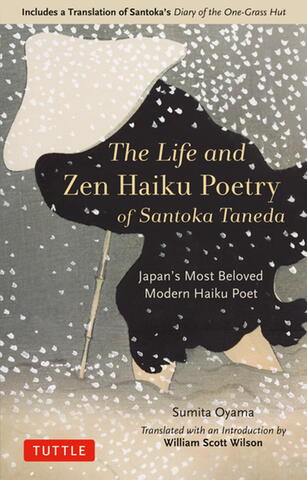
The Zen and Haiku Poetry of Santoka Tenada, by Sumita Oyama (trans. William Scott Wilson)
Is a poet’s life the support for poetry, or is poetry a support for the poet’s life? As much as Santoka Tenada, a mendicant Zen priest and haiku poet of the twentieth century, tried to live a good life according to the Tao, his inveterate love of sake and general need to carouse left him with poetry as the only means of perfecting what he was unable to perfect in life: mainly, the thing in us that wants to be better, the thing which, for a host of competing reasons, we are usually unable to achieve in life.
I’m drawn to lives of precarity in poetry, because it brings something elemental to the fore: fatuousness is rather rare when there’s no bread on the table. Earlier this year, I published a chapbook called Poor Rutebeuf, a translation of the French medieval poet Rutebeuf, which, as the title suggests, consists of a series of poems, sometimes funny, sometimes sad, lamenting his great state of powerlessness and poverty. Zen and haiku are connected to this too, since they are both, in some sense, concerned with turning the minimum into something full and rich. Rutebeuf was not mindful concerning this poverty, of course, blustering and medieval and eager as he was to grab the attention of any passing ear; but Santoka was. At a certain point, as he took stock of his diminishing material circumstances, I suppose Santoka had no other choice. That’s what haiku is, in a sense; a relationship to reality that cuts through the clutter. My favorite detail in the book takes place when a friend comes to visit him in his spare, four-mat hermitage, and, while eating the rice Santoka carefully prepared for him, asks the poet why he wasn’t partaking in it himself. Santoka replies that he only has one bowl and was waiting for his friend to finish up so he could wash it and serve himself some.
Santoka died at the start of World War II, so his story also depicts the kind of life that would rapidly become impracticable in postwar Japan. And so, by extension, it’s not only a poet, but a whole tradition that was on the verge of vanishing, once the smoke of war cleared up, into the overlit realm of billboards and shopping malls. The final sentence sums it up nicely: “as the tide of war worsened for Japan, rice and sake for those who did not work disappeared altogether.” Santoka, then, begging for his rice and sake, traveling on foot from town to town like a cigarette smoking Basho, served as a final representative.
The book is lovingly written by his friend and biographer, Sumita Oyama, who is very generous with Santoka and his antics – perhaps overly so. But at the end of the book, when Santoka passes away, I felt as if a friend had passed away; so I’m ready to forgive some of Oyama’s rosy oversights. Haunted by his mother’s suicide at a young age – she drowned herself in the family well – Santoka’s flight, his disengagement with what was expected of him as a modern subject, and his subsequent drift upon the surface of earthly things, eventually constituted his life, which he spent writing poetry, a cup of sake in hand, or else discussing aimlessly into the night with old friends. He lived his poetry, and in the end, life and poetry constituted a single breath. Cheers, Santoka.
— William Vallières is a Montreal poet. His work has appeared in The Walrus, Best Canadian Poetry 2019, Event, Grain, and Plenitude. His first book of poetry (Versus, 2019) is out with Véhicule Press. His chapbook Poor Rutebeuf, a translation of the French medieval poet Rutebeuf, was published by above/ground press in 2023.
You can find William Vallières' poetry in Issue 298 Winter 2024. Order the issue now:
Order Issue 298 - Winter 2024 (Canadian Addresses)
Order Issue 298 - Winter 2024 (International Addresses)











